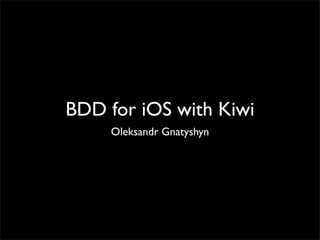
Bdd for ios with kiwi
- 1. BDD for iOS with Kiwi Oleksandr Gnatyshyn
- 2. Why BDD? Why Kiwi? Kiwi is BDD library for iOS, «RSpec» like, easy to setup and use. Kiwi Kiwi built on top of OCUnit and tightly integrated with Xcode! OCUnit
- 3. Why BDD? Why Kiwi? TDD - OCUnit : BDD - Kiwi : @implementation testTests describe(@"Team", ^{ context(@"when newly created", ^{ - (void)testThatTeamShouldHaveName it(@"should have a name", ^{ { id team = [Team team]; id team = [Team team]; [[team.name should] equal:@"Black Hawks"]; STAssertEqualObjects(team.name, @"Black }); Hawks", @"Team shuld have a name"); }); }); } 1. Design 1. Nice structure + 2. Test Logic 2. Better Assertions
- 4. Kiwi installation • Old School way - https://github.com/allending/Kiwi/wiki/Guide:-Up-and-Running-with-Kiwi • Easy way - CocoaPods!! //Podfile platform :ios target :KiwiUnitTest, :exclusive => true do pod 'Kiwi' end
- 5. Basic usage • SPEC_BEGIN(ClassName) and SPEC_END - SPEC_BEGIN(SpecName) macros that expand to begin and end a KWSpec class describe(@"ClassName", ^{ and group declaration. context(@"a state the component is in", ^{ __block id variable = nil; beforeAll(^{ // Occurs once }); afterAll(^{ // Occurs once }); beforeEach(^{ // Occurs before each enclosed "it" variable = [MyClass instance]; }); afterEach(^{ // Occurs after each enclosed "it" }); it(@"should do something", ^{ [[variable should] meetSomeExpectation]; }); context(@"inner context", ^{ xit(@"does another thing", ^{ }); pending(@"something unimplemented", ^{ }); }) }); }); SPEC_END
- 6. Basic usage • SPEC_BEGIN(ClassName) and SPEC_END - SPEC_BEGIN(SpecName) macros that expand to begin and end a KWSpec class describe(@"ClassName", ^{ and group declaration. context(@"a state the component is in", ^{ • describe(aString, aBlock) - starts a context that can __block id variable = nil; contain tests and nested contexts. beforeAll(^{ // Occurs once }); • context(aString, aBlock) - synonym for describe. afterAll(^{ // Occurs once }); beforeEach(^{ // Occurs before each enclosed "it" variable = [MyClass instance]; }); afterEach(^{ // Occurs after each enclosed "it" }); it(@"should do something", ^{ [[variable should] meetSomeExpectation]; }); context(@"inner context", ^{ xit(@"does another thing", ^{ }); pending(@"something unimplemented", ^{ }); }) }); }); SPEC_END
- 7. Basic usage • SPEC_BEGIN(ClassName) and SPEC_END - SPEC_BEGIN(SpecName) macros that expand to begin and end a KWSpec class describe(@"ClassName", ^{ and group declaration. context(@"a state the component is in", ^{ • describe(aString, aBlock) - starts a context that can __block id variable = nil; contain tests and nested contexts. beforeAll(^{ // Occurs once }); • context(aString, aBlock) - synonym for describe. afterAll(^{ // Occurs once }); • beforeAll(aBlock), afterAll(aBlock) - run once beforeEach(^{ // Occurs before each enclosed "it" before and after all the inner contexts and it blocks of variable = [MyClass instance]; the context it is in. }); afterEach(^{ // Occurs after each enclosed "it" • beforeEach(aBlock), afterEach(aBlock) - run before }); and after every it block in all enclosed contexts. it(@"should do something", ^{ [[variable should] meetSomeExpectation]; • it(aString, aBlock) - This is where actual actual }); expectations on objects should go context(@"inner context", ^{ xit(@"does another thing", ^{ }); pending(@"something unimplemented", ^{ }); }) }); }); SPEC_END
- 8. Basic usage • SPEC_BEGIN(ClassName) and SPEC_END - SPEC_BEGIN(SpecName) macros that expand to begin and end a KWSpec class describe(@"ClassName", ^{ and group declaration. context(@"a state the component is in", ^{ • describe(aString, aBlock) - starts a context that can __block id variable = nil; contain tests and nested contexts. beforeAll(^{ // Occurs once }); • context(aString, aBlock) - synonym for describe. afterAll(^{ // Occurs once }); • beforeAll(aBlock), afterAll(aBlock) - run once beforeEach(^{ // Occurs before each enclosed "it" before and after all the inner contexts and it blocks of variable = [MyClass instance]; the context it is in. }); afterEach(^{ // Occurs after each enclosed "it" • beforeEach(aBlock), afterEach(aBlock) - run before }); and after every it block in all enclosed contexts. it(@"should do something", ^{ [[variable should] meetSomeExpectation]; • it(aString, aBlock) - This is where actual actual }); expectations on objects should go context(@"inner context", ^{ xit(@"does another thing", ^{ }); • pending(aString, aBlock), xit(aString, aBlock) - doesn't do anything other than log a pending message pending(@"something unimplemented", ^{ to the output when run. }); }) }); }); SPEC_END
- 9. DEMO
- 10. Thanks! • Kiwi repo - https://github.com/allending/Kiwi • NSScreencast(episode about kiwi) - http://nsscreencast.com/ episodes/4-automated-testing-with-kiwi • Test Driving iOS Development with Kiwi by Daniel H Steinberg - iBooks Store Link
